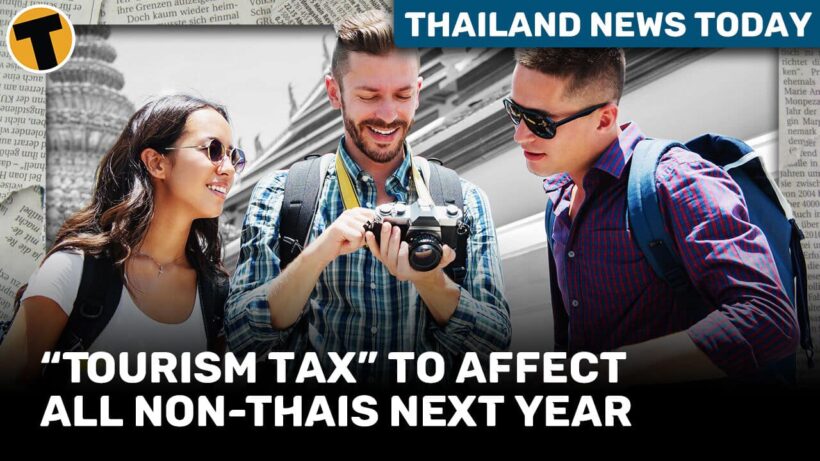Thailand News Today | “Tourism tax” to affect all non-Thais next year

Starting next year, foreigners entering Thailand by plane will have to pay an “entry fee” of 300 baht. The so-called “tourist tax” was originally intended for the start of this year, but was delayed to give Thailand’s tourism industry a chance to recover from the pandemic.
The fee will be introduced “next year” – presumably January 1, 2023 – according to Thailand’s Minister of Tourism Phiphat Ratchakitprakarn.
Foreigners flying into Thailand are required to pay the entry fee, no matter their visa status, while any foreigners who are in the Kingdom of Thailand for less than 24 hours will be exempt from paying the fee. The fee equates to 8 dollars and 22 cents.
Thai passport holders will be exempt from the tourist tax. Foreigners who hold work permits, foreign diplomats, and infants under 2 years old will most likely be exempt from the tourist tax as well, although this is yet to be confirmed by the ministry.
How Thailand intends to use the collected “tourist tax” remains a bit of a mystery. The Ministry of Tourism says the tax will be spent on developing tourist attractions. However, the ministry also said the tax will act as accident insurance – but exact details about what kind of incidents are insured have not been released yet.
On Saturday, Hatyai Songkhla Hotels Association spoke out against the government-imposed tourist tax. Association President Sitthiphong Sitthiphatprapha said the fee will act as another obstacle for tourists, especially if the fee is applied to tourists entering Thailand from Malaysia via the land border.
The association is worried that tourists coming into southern Thailand via car, bus or train might only plan on staying in the kingdom for a few days and could be deterred by the cost.
The Ministry of Tourism appears to have considered this point and plans to impose the tax on foreigners arriving by plane only, although the exact details are not yet set in stone.
The Deputy Secretary-General of the National Anti-Corruption Commission Prayut Puangchampa has been fired from his post for…well…corruption, specifically, having amassed an unusual amount of wealth. The NACC acts as a watchdog against corruption, but today they acted on one of their own, with the chairman signing an order confirming the deputy secretary-general’s dismissal yesterday. The firing comes after accounts and assets, many of which were stashed abroad, was uncovered, revealing 658 million baht in personal wealth. Though his exact salary is not confirmed, it is certainly not enough to amass such extreme wealth.
And the money was allegedly hidden away as well. NACC officials say that Prayad made false statements about six assets, valued at around two million baht, to deliberately conceal the wealth when he was confirmed to the post in 2017. Those items were held within Thailand but under his spouse’s name.
But since 2019, four other high-value assets were uncovered, stashed in other countries, and valued at a staggering 225 million baht.
Thailand’s Office of the Attorney-General will then be the agency to pursue the prosecution of Prayad at the Criminal Court for Corruption and Misconduct Cases.
The NACC is the department that takes on high-profile corruption cases and investigates them to seek justice. Recent cases include that of the Deputy Minister of Education accused of a land deal that encroached on a National Park, and a police officer accused of soliciting bribes from residents in Chiang Mai. Last year they investigated the confusingly wealthy officer Joe Ferrari after he suffocated a suspect in police custody, and previously they investigated the shocking number of extremely expensive watches worn by now acting Caretaker Prime Minister Prawit Wongsuwant. As for whether justice has truly been served on these high-profile cases…is a whole different story…let’s move on for now.
Thailand is in talks with the US to bring home ancient heirlooms. The Thai Deputy Government Spokesperson Rachada Dhnadirek revealed that the US Department of Homeland Security is in negotiations with the Denver Art Museum for the return of the Srivichai-era Bodhisattva Avalokiteshvara, and two bronze statues of the Dvaravati period, from the 7th to 11th. centuries AD.
The Bodhisattva Avalokiteshvara, known in Chinese as Guanyin, is the embodiment of the virtue of compassion and became the most important deity in Buddhism around the sixth century.
Ratchada added that the Thai Culture Ministry is also confident of the return of two more precious artifacts belonging to the kingdom: one from the Asia Society and Museum in New York, a Buddha statue of the Dvaravati period, and a stone sculpture from the British Museum. in London, which is also from the Dvaravati period.
The Thai Culture Ministry managed to negotiate the return of a 500 years old antique gold crown from the US in June. The crown, which weighs about 42g, is made of 95% pure gold in the Lanna art form and was used to decorate a stone-sculpted Buddha statue, a popular practice during the period as a religious offering.
Thailand also recovered two Khmer lintels from the Asian Art Museum in the US last year. The two Khmer stone lintels are believed to have originated from the Nong Hong palace in Buri Ram province and the Khao Lon palace in Sa Kaeo province. The two artifacts are now on show at Phanom Rung historical park in Buri Ram and Sdok Kok Thom historical park in Sa Kaeo province.
Famous Thai actor and singer Phakin Kamvilaisak hopes to make a splash with his charity swim across the Mekong River from Thailand to Laos and at the same time raise awareness about environmental issues and raise funds for hospitals in the two countries. Phakin, also known by his nickname Tony, revealed that he had met with his team to plan the upcoming mission called One Man & The River. He said the swim will be the most difficult thing he’s done in his life but it is for a worthy cause.
The 36-year-old revealed that he would swim 15 kilometers across the Mekong River starting from the Naga Monument in the northeastern province of Nakhon Phanom to Sikhotbun Stupa in Laos on Saturday, October 22.
Tono made it known that he selected the Mekong River because it is important for Thailand, especially for people in the Isaan province who believe in the mythical snake Naga. He said he wants the Thai and Lao people to take care of the river too.
The Khon Kaen-born celebrity revealed he would begin swim practice after his latest television drama ends filming at the beginning of next month.
Tono said he had been playing football to develop his leg muscles but still had to develop his breathing skills for swimming.
The former footballer with Ratchaburi and Ayutthaya United acknowledges the risk involved but believes highlighting the globe’s environmental problems makes it all worthwhile. He also believes the Naga will protect him from any danger.
Donations for the swim open on October 1 and close when the event ends on October 22. The donations will be split in half between Nakhon Phanom Hospital in Thailand and a hospital in Thakhek Town in Laos.
This isn’t Tono’s first charity splash, two years ago the actor planned to swim 82 kilometers across 12 islands over 18 days, from a pier in the southern province of Surat Thani to Koh Samui Island. Unfortunately, the swim had to be canceled after he had completed 27 kilometers because of the government’s Covid emergency decree rules. Cuz you know, Covid lives in salt water and all.
Latest Thailand News
Follow The Thaiger on Google News:


























